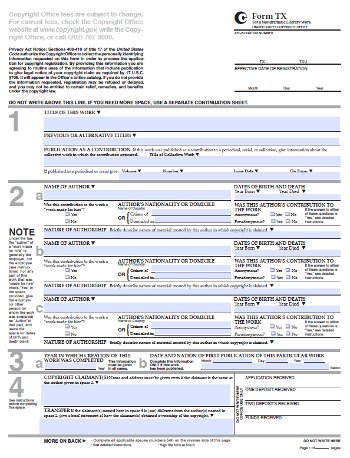How to Copyright and Information about Copyrighting
[retrieved from https://www.cajunc.com/art-copyright]Important Fact
You've probably heard that you don't need to copyright your work — you can just send a copy by U.S. mail to yourself and that will give a publication date. Well, if you're writing something worthwhile, (and what writing isn't worthwhile?) you need to pay the money and get it copyrighted. Otherwise, you'll have no enforcement power in court.
What You Can Copyright
You can copyright your literary works. Literary works include:
- books
- film
- tapes
- disks
- manuscripts
- periodicals
- cards
You can also copyright your photographs or graphics associated with the literary works. You can copyright unpublished works worldwide and published works if you live in the United States.
You Can't Copyright
You can't claim the copyright on a work made for hire — something you wrote for your employer. The employer owns the copyright on a work made for hire.
You can't copyright an idea or a procedure.
You can't copyright titles, names, short phrases or slogans or anything that is common property such as calendars, tape measures or tables taken from common sources.
The Copyright Notice
You don't have to place a copyright notice on your work, although the copyright office suggests that you do so. Notice was required under the 1976 copyright law, but in 1989, the United States accepted the Berne Convention regulations. If you're curious, you can read up on the current Berne Convention document at the World Intellectual Property Organization.
Nevertheless, the notice can be important. It serves as a warning that the work is protected, identifies the copyright owner and gives the year of first publication. The infringer can't claim innocence if you have the copyright information on the item.
Copyright syntax: The copyright office suggests that you use the copyright symbol or "Copyright" and the year of publication and the name of the owner, such as "Copyright 2012 Linda Richard" or "©2012 Cajun Collection".
You can't really get international copyright protection because each country has separate laws for acceptance and enforcement.
Your Rights
If you created the literary work after January 1, 1978, the copyright is in effect from the creation for the author's life plus 70 years after the author's death.
If you copyright your work, you'll get a certification from the copyright office and the exclusive right to reproduce the copyrighted work in copies and write derivative works based on the copyrighted work.
You can sell copies or display your work publicly.
You have the right to claim authorship of the work and to prevent the use of your name as the author of the work if it is prejudicial to your reputation. (Section 106)
You can transfer a copyright, but you must do it in writing and sign the agreement. You can transfer a nonexclusive right without written agreement.
Rights of Others
It's not an infringement of the copyright if someone comments, criticizes or uses your work for reporting, teaching, scholarship or research.
This is the fair use doctrine. (Section 107)
Libraries and archives can make a copy of your work for public view, so long as your copyright notice appears on the reproduced copy. (Section 108)
 Form TX PDF link
Form TX PDF link
How to Copyright Your Work
The copyright office has made it easy for you to get a copyright, and the cost has gone down if you use the online resources. The Electronic Copyright Office or eCO has a tutorial (PowerPoint) along with tips and FAQs that you can review before you start the process.
You'll have to register to use the online service. The cost in 2012 is $35 for online filing and $65 for paper filing and you can pay with credit or debit card. You can also set up an account with the copyright office if you anticipate more than occasional use.
The rules change and you can see the newest changes when you reach the first screen after signing in.
Click on "Register a New Claim" on the left of the screen and start the process. You can save and return to the screens if you need to check something. You can attach the file or mail it to the copyright office. Some files must be mailed, and you have three months to mail the completed work to the copyright office.
Form TX is the one you need for literary works except for periodicals and serials that require Form SE.
You'll need the title of the document, the author, date of creation and just about anything else you can think of. You just complete the form as requested. You'll send two copies of published work or one copy of unpublished work with your paper copy.
Wait for a response. You may get a call from the copyright office if the examiner has questions. If not, you'll receive a form in the mail once your copyright is complete.
Copyright records are public, and your information may be available through search engines or copyright databases.
Law and Contact Information
You can read the full law on the government website: http://www.copyright.gov/title17/92chap1.pdf.
The mailing address for the US Copyright Office is:
U.S. Copyright Office
101 Independence Avenue SE
Washington, DC 20559
And phone numbers are currently:
- (202) 707-3000 or
- 1-877-476-0778 (toll free)